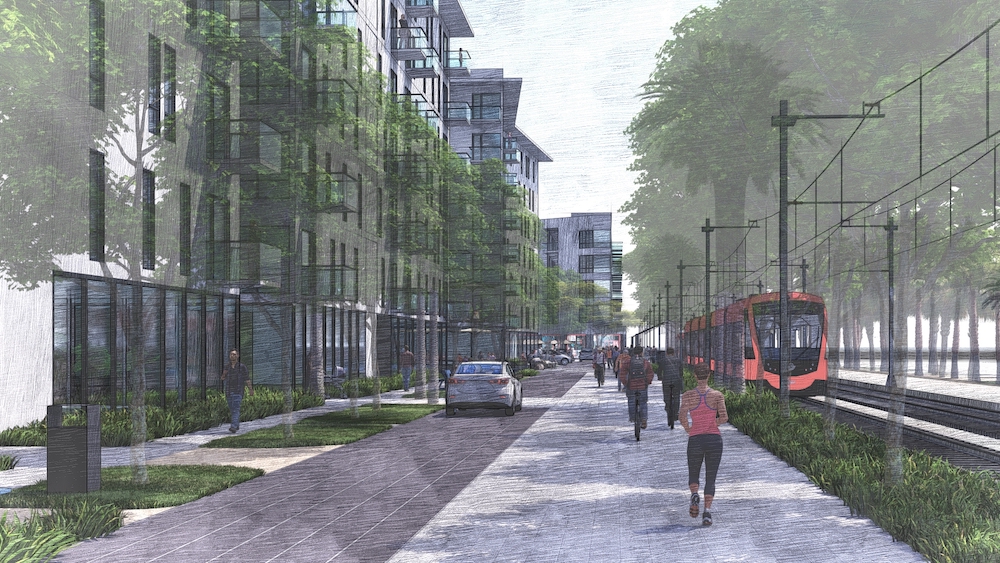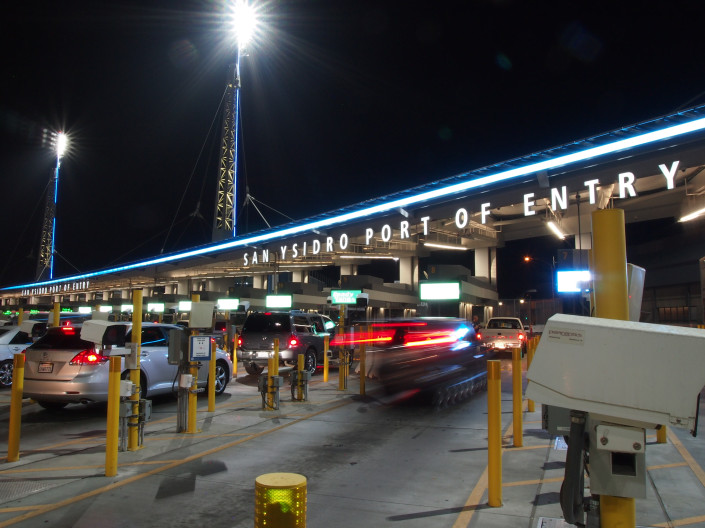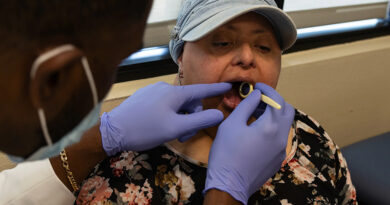Daily Business Report: Monday, Oct. 18, 2021
Despite a punishing drought, San Diego has water.
It wasn’t easy.
Sustainability measures that the city and county have taken
over decades are paying off. But residents still might have to do more.
By Jill Cowan | The New York Times
LAKESIDE, Calif. — In many parts of California, reminders abound that the American West is running out of water. “Bathtub rings” mark the shrinking of the state’s biggest reservoirs to some of their lowest recorded levels. Fields lie fallow, as farmers grapple with an uncertain future. A bed-and-breakfast owner spends $5 whenever a tourist showers.
But not in San Diego County.
In this coastal desert metropolis, life has stayed mostly the same for residents already accustomed to conserving what they have long treated as a precious resource.
On a recent afternoon, boats sped over the silvery surface of San Vicente Reservoir, a key water storage site for the county about 25 miles northeast of downtown San Diego. It was about as full as usual, cutting a sharp contrast with the desiccated lake beds where state officials have appeared in recent months, pleading with Californians to save water. The San Diego County Water Authority estimated that it would have sustainable water supplies through 2045, even if dry conditions persisted for years.
Now, with San Diego facing the prospect of orders to use even less water, its relative water plenty has become a case study in the uneven ways that the Western drought is affecting the nation’s most populous state. And the county’s try-everything approach to getting water has emerged as a model for cities — including Denver and Albuquerque — where leaders are dealing with one of climate change’s most dire effects.
PHOTO: San Vicente Dam and Reservoir (Courtesy of San Diego County Water Authority)
MTS board approves construction of 390
housing units along trolley line in South Bay
The San Diego Metropolitan Transit System (MTS) Board of Directors approved an agreement with two developers to build 390 housing units for low and moderate-income families at the Palm Avenue Trolley Station.
Earlier this year, MTS broke ground in another transit-oriented development at its Grantville Trolley Station with 250 units. The two projects are part of an agency-wide effort to fully utilize its park and ride lots.
National Community Renaissance and Malick Infill Corporation will build four separate residential buildings, together called Palm City Village. National Community Renaissance will build three of the buildings and the agreement requires the firm to break ground within five years (September 2026). Malick Infill Corporation will then be required to begin construction on the final building within 8 ½ years after National Community Renaissance breaks ground.
“This agreement sets the tone for what residents can expect to be developed on MTS land in the future,” said Nathan Fletcher, MTS Board Chair, and Chair, San Diego County Board of Supervisors. “MTS is intent on encouraging the construction of more housing for working families on its property in vibrant and environmentally sustainable communities built using a local skilled and trained workforce.”
OPINION:
Today’s school board fights recall the 1970s busing battles
By Jason L. Riley | Opinion Columnist, Wall Street Journal
Disgruntled parents, school board acrimony, and simmering racial tensions—these are the reactions to social activists who are trying to remake public education to their liking. For an older generation, however, this moment also recalls the busing wars of a half-century ago, a history no one should want to repeat.
Court-ordered busing of schoolchildren began in the South in the early 1970s, and the objective was to achieve more racial balance in public schools. The practice was controversial in part because the Civil Rights Act of 1964 stated explicitly that children must be assigned to schools “without regard to their race” and that desegregation did not require students to be placed in schools “to overcome racial imbalance.” The goal was to open schools to all races, not dictate where families could send their children.
Regardless, activist courts ignored the letter of the law at the urging of liberal elites and began signing off on school-integration plans that equated any racial imbalance in classrooms with de jure segregation. Soon, cities from San Diego and San Francisco to Minneapolis, Omaha and Cleveland were found guilty of operating deliberately segregated schools. The remedy was to bus students to whatever schools needed more members of a particular race to get the “right” mix. It was color-by-numbers, using children.
MAAC launches electric vehicle access program
to income-eligible San Diego County residents
The Metropolitan Area Advisory Committee on Anti-Poverty (MAAC) has partnered with BQuest Foundation to offer almost $2 million in low interest rate loans for the purchase of electric vehicles.
The primary purpose of the Electric Vehicle Access Program is to promote the adoption of plug-in hybrid and battery electric vehicles in low-to-moderate income communities, as well as increase renewable energy usage and reduce carbon emissions.
Income-eligible San Diego County residents who apply could receive up to $11,000 in grants and rebates. Poor credit is not a barrier to participation. A typical interest rate for those with low credit scores could be as high as 12 percent secure; MAAC’s program provides access to loans with interest rates as low as 3.99-5.99 percent.
Individuals participating in the program learn more about clean transportation, navigating the buying process, and making the transition from a fossil-fueled to a zero-emissions vehicle. Other features of MAAC’s Electric Vehicle Access Program include one-on-one financial coaching.
Click here for more information.
USS Germantown arrives in San Diego
following deployment to Japan
Amphibious dock landing ship USS Germantown moors pierside at its new homeport, Naval Base San Diego, on Friday. Germantown shifted homeports from Sasebo, Japan to San Diego after serving as a forward-deployed ship in U.S. 7th Fleet since Jan. 5, 2011. Since 2011, Germantown has participated in numerous operations and exercises across the Indo-Pacific including Cobra Gold, Valiant Shield, Kamandag, MTA Sama Sama, and Tiger Triumph 2019, the first U.S.-India bilateral exercise to feature all three joint services – Army, Navy, and Air Force.
Germantown sailed from San Diego on Jan. 5, 2011, replacing USS Harpers Ferry. USS Rushmore will replace Germantown later this year.
(Photo by Petty Officer 3rd Class Ethan Morrow)
Illumina appoints Bob Ragusa
as chief executive officer of GRAIL
Illumina, Inc. announced that Bob Ragusa has been appointed as chief executive officer of GRAIL, a health care company whose mission is focused on multi-cancer early detection, effective immediately. GRAIL currently operates as a separate and independent unit of Illumina.
Hans Bishop, who has been chief executive officer since June 2019, has chosen to step down and will serve as adviser to Ragusa through the end of 2021.
Ragusa is one of the most respected leaders in the industry with over 30 years of experience in genomics. As Illumina’s chief operations officer, he was responsible for significantly scaling the business to serve over seven thousand customers in more than 140 countries. He was also responsible for Illumina’s Clinical Lab Services which processed millions of genomic samples per year. His organization included the global Manufacturing, Clinical Lab Services, Supply Chain, Quality, Life Cycle Management, Information Technology, and Global Facilities and Real Estate teams, all committed to ensuring high product quality and customer satisfaction.
TrueCare partners with San Diego County
to provide rental assistance to residents
Renters within San Diego County whose income has been impacted because of COVID-19 restrictions, may now receive financial help from a new program for rental assistance.
TrueCare, a nonprofit health care provider for the diverse communities in North San Diego and South Riverside Counties, has joined the County of San Diego’s efforts to help families apply for COVID-19 emergency rent and past-due utility payment assistance. This is made possible through the Emergency Rental and Utility Assistance Program (ERAP).
Renters do not need to be TrueCare patients to obtain TrueCare’s help in applying for rental assistance. However, to qualify, applicants must show an inability to pay their rent by documenting a loss of income and lack of assets because of Covid.
To be eligible, a single renter’s income must be $67,900 a year or less; a couple’s combined income no more than $77,600, and a family of four, no more than $97,000 a year. Beginning Sept. 3, 2021, renters who are relocating and meet income level limits may obtain up to two months’ rent, including a security deposit, for a maximum of $7,000.
For more information, call (760) 736-6734.
SDSU to lead $3.5 million federally funded
program to train bilingual educators
San Diego State University will lead a new federally funded partnership to train hundreds of new bilingual educators for high-need communities across California.
Project Teach Bilingual Pathways will be funded by a $3.5 million grant from the U.S. Department of Education’s Office of English Language Acquisition.
SDSU will complete its work in concert with a consortium of regional partners, including the San Diego County Office of Education and its counterparts in Imperial County, Orange County and Butte County.
According to the California Department of Education, the state’s population of 1.1 million English learners is the nation’s largest.
Meanwhile, the state has faced persistent shortages of qualified bilingual educators.
San Diego’s Climate Action Plan
The City of San Diego released a draft of their updated climate action plan outlining ways the city can tackle climate change. The Climate Resilient SD plan identifies four primary climate change consequences that pose a risk to San Diego: sea-level rise, flooding/drought, extreme heat, and wildfires. The proposal lists actions that can be taken to combat the four different categories and any costs associated—including potential building electrification. The city will host an online workshop on Tuesday to share more information and solicit feedback on the plan.
UCSD granted $30 million to expand
developing brain study
The National Institutes of Health have awarded $30 million to researchers at UC San Diego over five years to expand studies focused on the developing brains of children and how environmental factors may affect their growth. The news comes the same week the university was granted $11 million to build a database of non-white DNA and an additional $929,000 to encourage tech-based entrepreneurship in underserved communities.
Athleisure brand Vuori joins
San Diego’s unicorn club
Following a $400 million investment by Softbank and a $4 billion valuation, Encinitas-based athleisure brand Vuori became San Diego’s newest unicorn. While growing its global distribution, the six-year-old company will double down on retail expansion in the U.S. with more than 100 store openings slated for the next five years..
San Diego data scientists with ties to Amazon,
Red Hat get $50 million for digital privacy startup
Gretel.ai, a San Diego startup working to keep sensitive data private but also still useful for developers to deliver better products and services, landed $50 million in a second round of venture capital funding. Founded in 2019 by data scientists with links to Amazon Web Services, RedHat and Netscout, Gretel is building software algorithms that create “synthetic” data sets out of real data that bake in privacy and help democratize the ability to build machine learning and artificial intelligence algorithms.
Aptera boosts global profile with new Asian Pacific CEO
San Diego EV startup Aptera Motors has beefed up its global profile with the hire of auto industry veteran Jim Chyou, announced as the company’s new Asia Pacific CEO. The move comes as the company confirmed it’s preparing to ramp up production “early next year.” Chyou has 30 years of automotive industry experience and will be tasked with building strategic alliances for Aptera across the region. Most recently, he served as vice president of Product Development at Chery Jaguar Land Rover in Shanghai, China.








